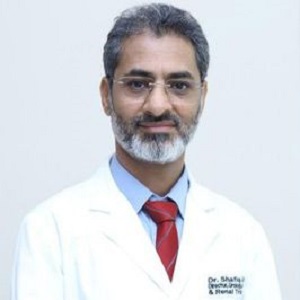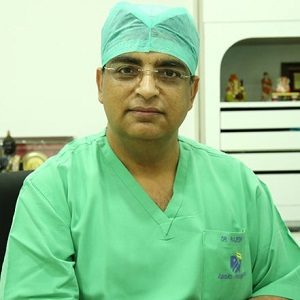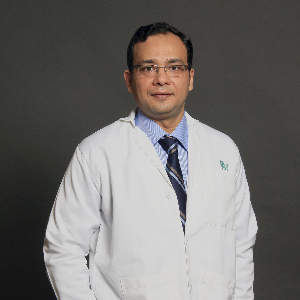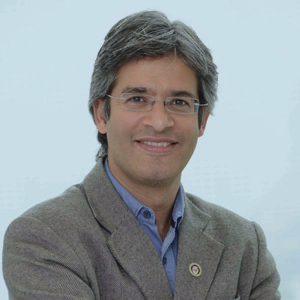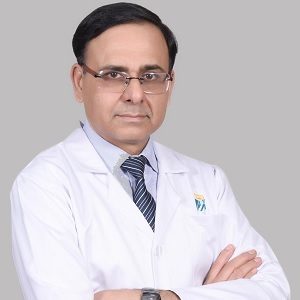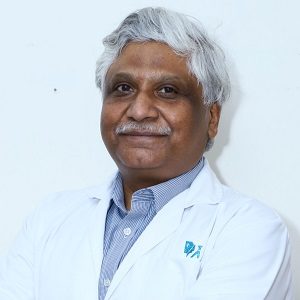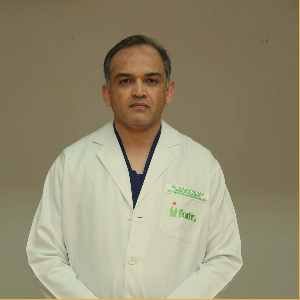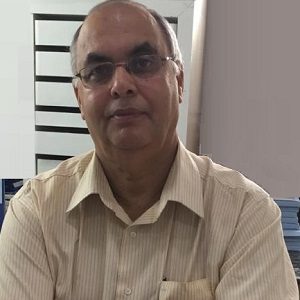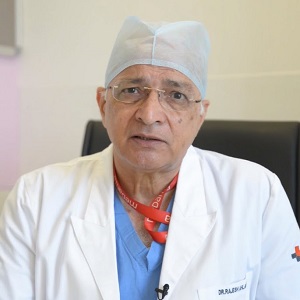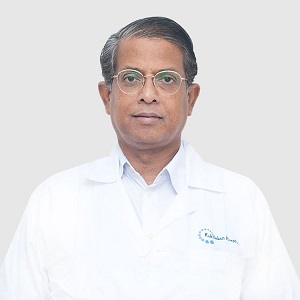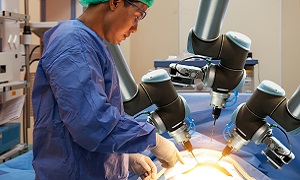Best Doctors in India for Prostatectomy
- Director – Urology, Andrology & Renal Transplants
- 16+ years
Profile Highlights:
Profile Snapshot of Dr. Shafiq Ahmed
- With over 16 years of experience, Dr. Shafiq Ahmed is a highly skilled urologist and robotic surgeon.
- He has previously worked at some of the best hospitals in India and was instrumental in establishing Renal Transplant Programmes in some of the top hospitals within Delhi-NCR.
- Dr. Ahmed also holds US credentials as a robotic uro-oncologist.
- He has authored numerous book chapters and articles in medical journals on urological diseases.
- As one of the leading urologists, robotic surgeons, and renal transplant surgeons, Dr. Ahmed has trained many upcoming doctors in his field.
- He has also been a prominent speaker at various medical conferences.
- Robotic Urologist, New Delhi, India
- Over 27 years’ experience
Profile Highlights:
- Dr. Rajesh Taneja is one of the best Urologists in India, having experience of more than 27 years in the specialization. He is practicing at Apollo Hospitals, New Delhi as a senior consultant.
- Dr. Taneja specializes in surgeries to correct Congenital anomalies of urinary organs; Phimosis, PUJ Obstruction, Megaureter, Hydronephrosis, Vesicoureteric reflux (VUR), Hypospadias, Posterior Urethral Valves (PUV), Ectopia vesicae, and others.
- He is formally trained in the Robotic Surgical system and is one of the few urologists performing Robotic urological surgeries in India.
- Dr. Taneja has expertise in the Holmium Laser Enucleation of prostate technique.
- He has written numerous papers in national and international scientific publications.
- Dr. Rajesh Taneja also authored a book titled ‘Interstitial Cystitis’.
- Urologist, New Delhi, India
- Over 23 years’ experience
Profile Highlights:
- One of the outstanding doctors in the field of Urology, Dr. Anshuman Agarwal has spent 23+ years perfecting Robotic surgery and Laparoscopic surgery for urological cancer in India.
- He is an expert in minimal access surgery which includes Holmium laser surgery for Prostate (HOLEP) and PCNL, and RIRS for stones.
- Dr. Anshuman Agarwal has been a Senior Consultant in Fortis Hospital, RG Stone Hospital, and Rajiv Gandhi Cancer Institute and is currently functioning as a Senior consultant Urologist with Indraprastha Apollo Hospitals, New Delhi which is a state-of-the-art urology facility.
- Dr. Anshuman Agarwal has performed over 200 robotic surgeries for Prostate Cancer, Kidney, and Bladder and is known as one of the most renowned urologists in New Delhi.
- Uro Oncologist, New Delhi, India
- Over 20 years’ experience
Profile Highlights:
- Dr. Gagan Gautam is considered among the best Uro Oncology surgeons of the country and has performed more than 700 surgeries related to kidney, prostate and urinary bladder cancer.
- He has worked at the leading cancer centers of the world and also trained at some of the best cancer hospitals.
- Dr. Gautam is renowned for using robotic procedures during uro cancer surgeries and is among the very few doctors in India who are highly skilled in Robotic uro surgery.
- Urologist, New Delhi, India
- Over 30 years’ experience
Profile Highlights:
- Dr. Vipin Arora is a well-known Urologist in Delhi who has been practicing for more than 30 years with success.
- Currently, he is working as a senior consultant for Urology & Andrology at Apollo Hospital, New Delhi.
- Dr. Arora specializes in prostate diseases, Uro-Oncological surgeries, and laparoscopy procedures. He is the frontrunner in Robotically- assisted laparoscopic radical prostatectomy, Urologic oncology.
- Dr. Arora pioneered the Robotic Prostate Surgery technique in India.
- He also offers CAPD, Extracorporeal shock wave lithotripsy, Flexible Ureteroscopy, Laser treatment, Polycystic Kidneys treatment, Cadaver and Live Renal Transplant, GU prosthetics, Stress Incontinence surgery TVT TOT, and TURP.
- Pediatric Urologist, New Delhi, India
- Over 25 years’ experience
Profile Highlights:
- Dr. Sujit Chowdhary is one of the best Pediatric urologists in Delhi, India.
- He has been practicing for over 25 years and is currently working as a senior consultant for Pediatric Urology & Director of the Apollo Institute of Pediatric Sciences, New Delhi.
- Dr. Sujit Chowdhary also won many awards for his contributions to the field.
- The doctor and his team established a premier robotic pediatric urology program in the Asia-Pacific.
- His unit takes care of newborn surgeries, robotic surgery, minimally invasive surgery, and many other subspecialties of the field.
- Dr. Sujit Chowdhary’s published peer reviews and citations complemented his experiences. He has written about 90 peer reviews and 350 citations.
- Urologist, Gurugram, India
- Over 20 years’ experience
Profile Highlights:
- Dr. Rajiv Yadav is a reputed urologist in India with great experience in Prostate, Kidney & Urinary bladder disorders.
- His clinical focus is on Robot-assisted Laparoscopic Surgery for Prostate Cancer, Kidney Cancer, and Urinary bladder cancers.
- He completed his training at the most prestigious institutes including AIIMS, Delhi & Weill Cornell Medical & New York-Presbyterian Hospital, USA.
- Urologist, New Delhi, India
- Over 42 years’ experience
Profile Highlights:
- Dr. Suresh Kuamr Rawat is one of the best Urologists in India, having a grand experience of 42 years in the field.
- His services extend into prostrate laparoscopy, TUIP, TURP, minimally invasive surgery, etc.
- Dr. Suresh Rawat is practicing as a consultant with the Department of Urology at Apollo Hospitals, New Delhi.
- Dr. Rawat specializes in neuromuscular disorders, Andrology, and complex urological surgeries. He is an expert doctor for Endourology, Uro oncology, Reconstructive Urology, Female Urology, and Pediatric Urological treatment.
- Urologist and Renal Transplant Surgeon, Gurugram, India
- Over 40 years’ experience
Profile Highlights:
- Dr. Rajesh Ahlawat is one of India’s top kidney transplant surgeons, who has worked in leading Institutions in North India and has established successful Minimally Invasive Urology programs including Robotic Surgery and Kidney Transplant services with excellent outcomes comparable to the best in the world.
- Throughout his career, Dr. Ahlawat has initiated and established four successful Urology and Renal Transplant programs in India
- Urologist and Kidney Transplant Surgeon, Mumbai, India
- Over 30 years’ experience
Profile Highlights:
- With over 30 years of experience, Dr. Bejoy Abraham has worked as a consultant at premier institutes such as CMC, Vellore, and Addenbrookes Hospital, Cambridge, UK.
- He has vast experience in kidney transplant, management of kidney stones, cancer conditions of the bladder, reconstructive urology, erectile dysfunction as well as Pediatric urology.
Best Hospitals in India for Prostatectomy
Indraprastha Apollo Hospital, New Delhi
- City: New Delhi, India
Hospital Highlights:
- Indraprastha Apollo Hospital is a 700-bedded multispecialty hospital in the heart of the capital of India. It is a part of Apollo Hospital group, one of India’s most reputed healthcare chains. Indraprastha Apollo Hospital has been accredited by Joint Commission International, making it the first internationally accredited hospital in the country in 2005.
- There are 52 specialties in the hospital with one of the best cardiology centers in the country. The hospital is also equipped with State of the art infrastructure facilities with the largest Sleep Lab in Asia and the largest number of ICU bed facilities in India.
- The hospital also has one of the largest dialysis units in India along with a dedicated Bone Marrow Transplant unit.
- The latest and highly advanced technologies that are installed in the hospital include Da Vinci Robotic Surgery System, PET-MR, PET-CT, Cobalt-based HDR Brachytherapy, Brain Lab Navigation System, Tilting MRI, Portable CT scanner, 3 Tesla MRI, 128 Slice CT scanner, DSA Lab, Endosonography, Hyperbaric Chamber and Fibro scan.
Fortis Memorial Research Institute, Gurugram
- City: Gurugram, India
Hospital Highlights:
- Fortis Memorial Research Institute is a multi-super-specialty, quaternary care hospital with 1000 beds. The hospital comprises reputed clinicians, and international faculty and is also equipped with cutting-edge technology. The hospital is a part of Fortis Healthcare Limited, a reputed chain of private hospitals in India.
- It is a NABH-accredited hospital that is spread across 11 acres of land and has a capacity of 1000 beds. The hospital has 55 specialties and is one of the premier health care centers in the Asia Pacific region popularly known as “the Mecca of Healthcare”.
- The hospital has 260 diagnostic centers and is also equipped with the latest and advanced techniques that include 3 Telsa which is the world’s first Digital MRI technology. The hospital also has world-class Radiation Therapy techniques which have been developed by leading technology experts from Elekta and Brain Lab.
Apollo Hospital, Chennai
- City: Chennai, India
Hospital Highlights:
- Apollo Hospitals, Chennai, is one of the best hospitals for heart care in India. Over the years, Apollo has expanded all over India, as a healthcare chain.
- India’s first ‘Only Pancreas’ transplant was performed in Apollo Hospital. The hospital is known for successfully performing Asia’s first en-bloc combined heart and liver transplant, and over the years, it has attained a remarkable achievement in the global healthcare space. Around 3-4 organ transplants are performed in the hospital per day.
- Equipped with over 500 beds, this hospital in Chennai was established in 1983 and since then has been among the most preferred hospital for patients from all over the world.
- The hospital holds accreditation of the NABH and JCI and is the first hospital in India to be ISO 9001 and ISO 14001 certified. It is also the first South Indian Hospital to receive subsequent reaccreditation from the JCI USA 4 times.
Medanta-The Medicity, Gurgaon
- City: Gurugram, India
Hospital Highlights:
- One of India’s best and largest multi-specialty hospitals, Medanta was built with the aim to bring India to the highest standards of medical care. The hospital has been providing the best medical services to its patients, since its inception, with care, commitment, and compassion.
- Equipped with 1250 beds, the hospital was founded by Dr. Naresh Trehan in the year 2009 with an aim to provide the best medical care at affordable costs. The hospital is spread across 43 acres and includes 45 operation theatres and 350 beds dedicated solely to ICU. The hospital includes over 800 doctors, and more than 22 specialty departments and has a dedicated floor for individual specialty in order to offer the best services under one roof.
- The hospital is considered one of the premier institutes in India for Cardiac Care and includes staffs and members of high caliber. The hospital has 6 distinct centers of excellence.
Max Super Specialty Hospital, New Delhi
- City: New Delhi, India
Hospital Highlights:
- One of the well-regarded providers in India committed to the highest standards of clinical excellence and patient care, Max Super Specialty Hospital is a part of Max Healthcare, which is the second-largest healthcare chain in India. Regarded as one of the most well-regarded healthcare providers in the country, Max Super Specialty Hospital is committed to the highest standards of clinical excellence as well as patient care. The hospital is also equipped with the latest technology as well as cutting-edge research. The hospital is known to deliver and ensure the highest level of patient care.
- The hospital has more than 500 beds and offers treatment for over 35 specialties. The hospital also holds the credit of having installed the first Brain Suite in Asia. This is a highly advanced Neurosurgical machine that allows MRI to be taken while surgery is ongoing.
- Other advanced and latest technologies are also installed in the hospital such as the 1.5 Tesla MRI machine, 64 Slice CT Angiography, 4D ECHO, LINAC, and 3.5T MRI machine.
Artemis Hospital, Gurugram
- City: Gurugram, India
Hospital Highlights:
- One of the most well-known hospitals in the Delhi NCR, Artemis Hospital is the first hospital in Gurugram to get accredited by the Joint Commission International.
- With more than 40 specialties, the hospital has been designed to be one of the most technically advanced hospitals in the country, with the best medical and surgical health care. The hospital has eleven special and dedicated centers, for Heart, Cancer, Neurosciences, etc.
- The latest technologies in the hospital include Endovascular Hybrid Operating Suite and Flat panel Cath Labs for the cardiovascular department, 3 Tesla MRI, 16 slice PET CT, 64 Slice Cardiac CT Scan, HDR Brachytherapy, and highly advanced Image Guided Radiation Therapy techniques (LINAC) are installed in the hospital.
- The hospital has won several awards as well, since its inception.
BLK Max Super Specialty Hospital, New Delhi
- City: New Delhi, India
Hospital Highlights:
- Equipped with 650 beds, BLK Superspecialty Hospital is the largest stand-alone private sector hospital in Delhi.
- With over 1500 healthcare providers and 150 globally renowned super specialists, the hospital is one of Asia’s largest Bone Marrow Transplant Centres. The hospital is known for having some of the best cancer doctors in the country.
- The hospital is NABH and NABL accredited and was inaugurated by the first Prime Minister of India. Pt. Jawahar Lal Nehru.
Kokilaben Dhirubhai Ambani Hospital, Mumbai
- City: Mumbai, India
Hospital Highlights:
- Kokilaben Dhirubhai Ambani Hospital, Named after the wife of Indian industrialist Dhirubhai Ambani, the founder of Reliance Industries, this is one of the top hospitals in Mumbai. This 750-bed multi-specialty hospital became operational in 2009. Known as one of India’s most advanced tertiary care facilities, the hospital is designed to raise India’s global standing as a healthcare hub, with an emphasis on excellence in clinical services.
- Kokilaben Dhirubhai Ambani Hospital uses Protocol and Care Pathway based treatment models to ensure the best outcomes for patients.
- The hospital represents a confluence of top-notch talent, cutting-edge technology, state-of-the-art infrastructure, and, most importantly commitment.
- The hospital also holds the accreditation of the NABH, NABL, CAP, and JCI.
- The hospital has been recognized as the No. 1 Multispecialty Hospital in Mumbai and the West Zone for the fifth year in a row in 2020 by The Week.
Rela Hospital, Chennai
- City: Chennai, India
Hospital Highlights:
- RIMC is a multi-specialty hospital in a sprawling area of 36 acres located in Chromepet, Chennai, Tamil Nadu, India.
- The facility has 450 beds including 130 critical care beds, 9 operating rooms, modern reference laboratories and radiology services, and is conveniently located near road, rail and air transportation.
- RIMC is led and managed by world-renowned physicians committed to healthcare.
- RIMC offers the broadest range of clinical care, education, and research. The hospital offers state-of-the-art technology and modern treatment facilities designed to provide health care at an affordable cost.
- Rela Institute is driven by patient needs, comfort and confidence.
CARE Hospitals, Hyderabad
- City: Hyderabad, India
Hospital Highlights:
- CARE Hospitals were established in the year 2000, by CARE Group.
- The multispecialty hospital has 435 beds, including 120 critical care beds, with an annual inflow of 180000 outpatients and 16,000 in-patients.
- The hospital provides specialty medical services in Cardiology, Cardiothoracic Surgery, Pediatric Cardiology, Pediatric Cardiothoracic Surgery, Neurology, Neurosurgery, Nephrology, and Urology.
- The hospital has the first dual source, 128 slice CT scanner (for high precision cardiac imaging) – the first of its kind in south India.
- The hospital offers a wide range of accommodation facilities for the convenience of its varied patient base, ranging from general wards to super deluxe rooms.
Prostatectomy
Prostatectomy is a procedure for removing part or all of the prostate gland. The prostate gland is responsible for carrying urine from the bladder to the penis. This gland is located in the male pelvis below the urinary bladder.
Depending on your situation, prostatectomy can be performed in many ways. Options generally include traditionally open surgery and minimally invasive surgery which is performed with robotic assistance.
This procedure is used for treating a number of conditions which affect the prostate. Generally, it is used as a treatment for prostate cancer.
Purpose
Prostatectomy is generally done for treating localized prostate cancer. It might be used alone or in combination with radiation, hormone therapy and chemotherapy.
Radical prostatectomy is a surgery for removing the entire prostate gland and surrounding lymph nodes. This is for treating men with localized prostate cancer. Different techniques can be used for performing a radical prostatectomy, some of which includes:
Robot-assisted radical prostatectomy- In this method, the surgeon makes five to six small incisions in your lower abdomen for removing the prostate. He or she sits at a console and uses instructions attached to a computer-assisted mechanical device. The robotic device can allow a more precise response to the movement of the surgeon’s hands.
Open radical prostatectomy- In this method, your surgeon generally makes an incision in your lower abdomen for removing the prostate.
Less often, simple prostatectomy might be recommended for men who suffer from severe urinary symptoms and enlarged prostate glands. Generally, simple prostatectomy is performed as a minimally invasive procedure using robotic assistance.
Before the procedure
Before your procedure, your doctor might want to do a test, which uses a visual scope for looking inside your urethra and bladder. It is important for your doctor to check the size of your prostate and examine your urinary system. Your doctor might also sometimes want to perform a few other tests.
It is important to let your doctor known about any medications or supplements that you might take. You might need to stop taking any blood-thinning medications and pain relievers such as aspirin.
It is also important to fast before the surgery, for at least 12 hours. You might also be given a kit and instruction so that you can give yourself an enema for clearing your bowels before the surgery.
It is important to avoid wearing items such as jewelry, eyeglasses, dentures or contact lenses. It is also important to ask your doctor how long you will be in the hospital. It is best if you are able to arrange a ride home in advance, as you won’t be able to drive for some time after the procedure.
It is also important to talk with your doctor regarding how much time will be required for recovery.
Procedure
This procedure is performed using general anesthesia. It means that you are asleep during the procedure. You might also be receiving an antibiotic right before the surgery to prevent an infection.
Robot-assisted radical prostatectomy
Robot-assisted radical prostatectomy: In this method, your surgeon sits at a remote-control console near you and the operating table. He/she precisely controls the motion of the surgical instruments with the aid of two hand-and-finger control devices. The console is able to display a magnified, 3D view of the surgical area which enables your surgeon to visualize the procedure in detail.
The robotic system allows smaller and precise incisions. This usually helps in faster recovery as compared to traditional surgery.
Open radical prostatectomy
Open radical prostatectomy: In this method, the surgeon will make an incision in the lower abdomen from below your navel to just above your pubic bone. Then he/she will be carefully dissecting the prostate gland from the surrounding nerves and blood vessels. Then the surgeon will remove the prostate along with its nearby tissues. After this, the incision will be closed with sutures.
Simple prostatectomy
In simple prostatectomy, first, your doctor might be inserting a long, flexible viewing scope, i.e. a cystoscope through the tip of your penis to see inside your bladder, bladder and prostate area. Your doctor will next insert a tube known as a Foley catheter into the tip of your penis that extends into your bladder. This is done to drain urine during the procedure. The location of incisions will depend on what technique is used by your doctor. If you also have a hernia or bladder problem, your doctor might repair it using the same surgery.
After your doctor has removed part of your prostate that causes your symptoms, one to two drain tubes might need insertion through punctures in your skin near your surgery site. These tubes are temporary. One tube will go directly into your bladder and the other tube will be going into the area where the prostate was removed i.e. pelvic drain.
After the procedure

After your procedure, you might receive pain medications from your doctor. You might be able to walk on the day of the surgery or after one day. It is important to do exercises to move your feet, while you are still in bed.
You can expect to go home one day after the surgery. Most men generally need a urinary catheter for around seven to ten days after surgery. Full recovery of urinary control might take up to a year after surgery.
In around four to six weeks, you should be able to resume your normal routine. It is also important for you to see your doctor a few times in order to make sure everything is okay. If you are going through any problems, you might need to see your doctor sooner.
If you undergo a simple prostatectomy, you may still be able to orgasm during sexual activities, but there might be little or no semen. After radical prostatectomy, it might take around 18 months for a full recovery of erectile function.
Risks
Both radical and simple prostatectomy carries few risks. The risks associated with radical prostatectomy include:
- Bleeding
- Urinary tract infection
- Narrowing of the urethra or bladder neck
- Urinary incontinence
- Formation of cysts containing lymph
- Erectile dysfunction
Risks associated with a simple prostatectomy include:
- Bleeding
- Dry orgasm
- Urinary tract infection
- Urinary incontinence
- Erectile dysfunction
- Narrowing of the urethra or bladder neck

